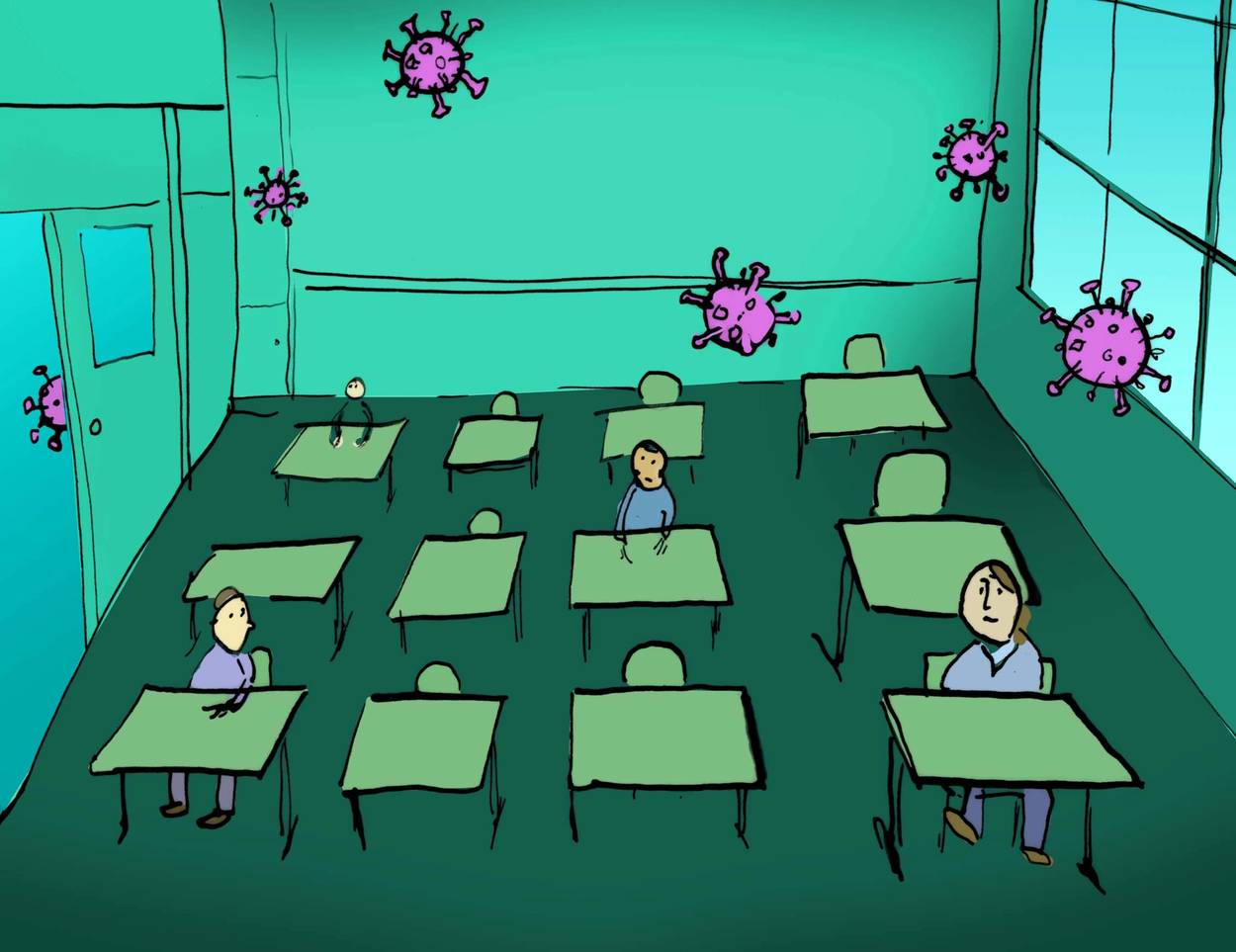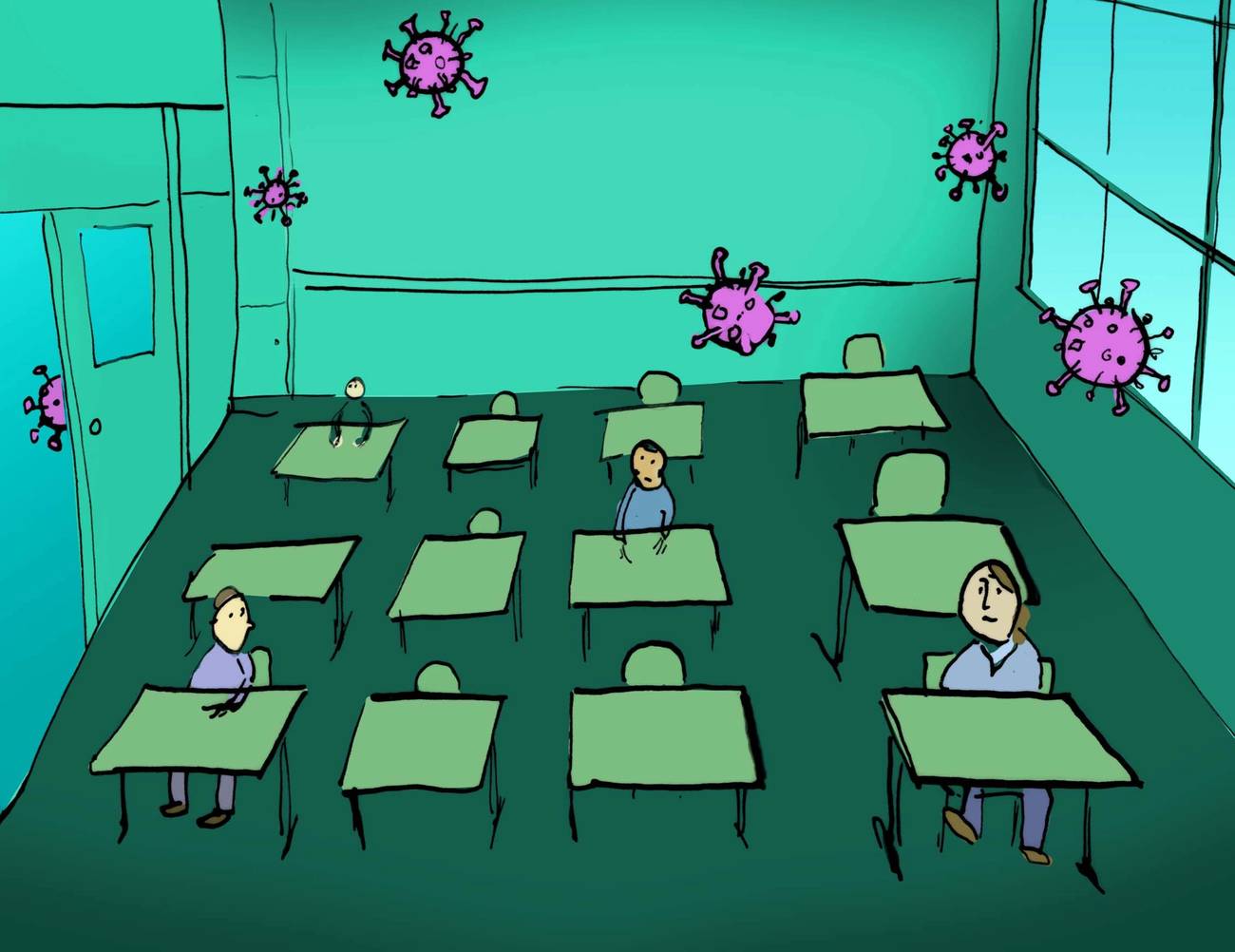COVID-19 Is Imperiling the Jewish Day School
Jewish day schools are already threatened. The virus may be more than they can handle.




Five-year-old Jonah Richter has been happily enrolled at Manhattan Day School since he was 3. Before the arrival of COVID-19 and Zoom learning, his parents had planned for Jonah to continue at MDS for kindergarten. Now they are waiting to learn what the fall might look like. “MDS is doing a phenomenal job with early childhood,” his mother, Jessica Morgan Richter, said. Nevertheless, she is acutely aware of the technology’s limits. “I know from my own experience and from that of other parents, no 4-year-old is doing any activity unless a parent is sitting there with them. If I have to check on the baby, everything falls apart.” For now, she is optimistic, but not certain, about her son’s return in the fall. “We’re going to try to stay the course at MDS,” she said, “unless it’s a 100% Zoom situation.”
Across the country, parents and schools are struggling with their contingency plans for the fall. Can children keep 6 feet away from each other? Can they be trusted to wear masks? And will teachers come back? But looking ahead, Jewish day schools, especially in the expensive New York City market, face special challenges in adjusting to COVID-19. They have a whole set of fears. Private school is a luxury, and Jewish day school in particular is a leap for many parents. Will parents pay tuition for a subpar experience that involves some distance learning? If not, and their children start nursery school or kindergarten at public schools, how likely are they ever to switch to Jewish school?
If enough parents decide to keep their children home, or move out of cities, Jewish day schools might suffer painful enrollment drops, both this year and the next, which may affect the schools for years to come. Put another way: There might be whole cohorts that leave for good, or never show up. “These are the things that keep us up at night,” said Ruth Gafni, head of N-8 at New York City’s Ramaz School, which is modern Orthodox. “The pandemic has caused education to go through the greatest transformation of any era.”
“Zoom preschool is not for my child,” the mother of a student at a Manhattan Jewish day school said. “She’s just not interested. Most of my day I have to chase her around to get her to go to class.” This mother, who asked not to be named, said that she doesn’t know what to do next year if her child won’t be able to return to school: “Who is going to pay $30,000 to chase their child around the house? If I’m going to have to do that, I’ll enroll her in public school until this is over, or home-school her.”
Stephanie Ives, head of school for Beit Rabban, a Manhattan day school that goes from nursery school through eighth grade, said that “preschool is a very weak link everywhere right now—not only in Jewish day schools.” But that is not her worry. “I’m not terrified of having fewer children apply for early childhood next year—I’m terrified of people moving out of the city and never coming back. There’s nothing you can do about this, and it has nothing to do with the quality of your product. It’s about the cost of living. And many people are one-income families now, and others may lose their jobs.”
Rumor has it that one-third to one-half of families with children in private schools are already living outside of New York City. “If you have a significant number of families who have already left for Deal, New Jersey, or the Hamptons, to think they are all coming back in the fall—when there are Jewish day schools in all those places, that’s very risky,” Ives said. “You should not be counting on all these people coming back.” Before COVID-19, projections for Beit Rabban enrollment next year were “over 140 students,” Ives said, but she now fears enrollment may dip below 130. “For a small school like we are, that’s huge.”
Not long ago, Jewish day schools enjoyed enthusiastic growth. Some traced the surge to the panic that ensued after the 1990 National Jewish Population Survey showed that over half of American Jews were marrying non-Jews. Only seven years after the study, a New York Times story noted “a striking resurgence in Jewish education that has seen nearly 40 Jewish private schools open in New York, Atlanta, Baltimore, Boston, New Haven, Minneapolis, and Cleveland in the last six years, with many others on the way.” The Forward hailed the news as “one of the most significant trends in American Jewish life in decades.”
“These were the Clinton years,” explained Jonathan Krasner, a Brandeis professor. “This was a time when America was flush with cash—the stock market was booming and you had a long economic expansion that saw real growth in workers’ salaries. So, there was the will to build more schools—and also the way.” Philanthropists lined up to support the effort. The ethos was “if they build more schools, they will come,” said Paul Bernstein, who runs PRIZMAH, a network for Jewish day schools in North America.
Today, there are 309 non-Haredi day schools enrolling 83,000 students K-12 in the U.S. At many, enrollment is already below Clinton-era peaks. Steadily rising tuition combined with the 2008 market crash and the ensuing recession, says PRIZMAH’s Bernstein, led to closings or mergers of some Jewish day schools. In New York City, tuition ranges from $30,000 for nursery school to $48,000 for high school per year. Los Angeles’ Shalhevet High School is $33,000 per year, the Jewish Day School of Metropolitan Seattle is $27,000 a year for middle school and $19,150 for five-day pre-K. The Joseph & Florence Mandel Jewish Day School in Cleveland is $16,900 for eighth grade and $11,900 for kindergarten.
Meanwhile, demographics disfavor all but the Orthodox. “There has been tremendous population growth in the Haredi wing of the Orthodox world,” Krasner said. “Numbers in the modern Orthodox schools have stayed pretty constant. Parents today are having about the same number of kids their parents had. On the other hand … the Conservative movement has suffered serious declines in membership over the past 20 years, so it is not surprising that the numbers of children going to Conservative day schools has declined. So even if you put aside affordability—there are simply fewer Conservative kids growing up now than there were a generation ago.”
Enrollment in Conservative-movement schools dropped 45% between 1998 and 2013. At the same time, however, enrollment in community day schools, unaffiliated with any movement—like the Abraham Joshua Heschel School in Manhattan and the Hannah Senesh School in Brooklyn—grew 37% between 1998 and 2013. The day-school accomplishment is deep, preparing students to be fluent in their ancient tradition and qualified for admission to elite colleges, but the numbers are still soberingly small. Only 1 in 10 non-Haredi American Jewish families sends their children to day schools.
COVID-19, and the economic changes it will bring, may strike a blow to these schools, or it may trigger the next round of adaptations and improvements. Philanthropists have again stepped up to help ease the financial shock the pandemic may cause the schools. UJA Federation has created a $2 million fund for increased tuition assistance for families with children in Jewish day schools. Jewish Communal Response and Impact Fund (JCRIF) just announced it would offer tuition assistance grants to 20-30 small- and medium-size PRIZMAH schools of $50,000 to $100,000 each.
But this fall, it seems certain that many families will opt out of their Jewish schools, or even their metro areas—and more than a few will drop Jewish education for a mishmash of secular, and DIY home-schooling. Recruiting the next cohort of Jewish-school students will be awkward, to say the least. Virtual tours for the under-5 set will be competing against the memory of in-person schooling, and against the reality of the new normal in family life. But Jewish day schools have no choice but to compete, and more than their survival hangs in the balance.
Emily Benedek has written for Rolling Stone, The New York Times, Newsweek, The Washington Post, and Mosaic, among other publications. She is the author of five books.